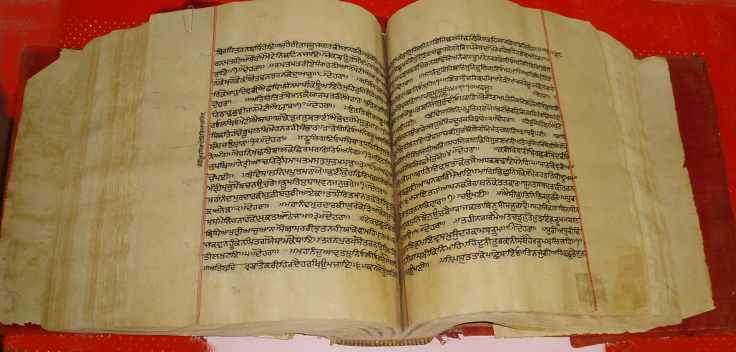The Naad of Jaap Sahib rouses the soul and the self of the Being. ‘Sahib’ means ‘grace’. Recite it when your position is endangered, or when your authoritative personality is weak. This Bani brings grace and greatness. It will also give you the ability, that whatever people say, you will automatically be able to compute what they are actually saying. And, once you are able to to recite it correctly, it will give you the power, the Siddhi, that whatever you say, must happen. Man can direct God and God can direct man. Guru Gobind Singh recited Jaap sahib so that we would not become beggars at the doors of others.
Jaap Sahib, given place of prominence in the Dasam Granth is the invocation made by the khalsa—a hymn in praise of the omnipotent God. The attributes and qualities of God delineated herein are based on the transcendental nature of God, He who is without attributes as in the ideology of Nirgunwad. While on one hand the form and shape of the Almighty God as portrayed in Gurbani have been further honed and highlighted, on the other hand there is an elaboration and embellishment of it. There is specific purpose behind this literary creation and it has been written in a unique style. The Jaap Sahib has no equal In fact, of all the transcendental literature written in the middle ages, the Jaap Sahib stands out unique for delineating the humanitarian attributes of God who is without attributes by presenting them in a worldly and universal form. It has proved itself as a cardinal literary piece in all northern Indian literature for its brilliance, sublimity and majesty. The Jaap Sahib has no equal. The Jaap Sahib has evolved as the product of extensive reflection, cogitation and deliberation through moments of awe and reverence experienced by Guru Gobind Singh Ji. In this creation the various attributes of God almighty have been depicted – He is without caste, without creed, without community, without religion and he is “fearless.” He is the destroyer of enemies too. This aspect of “the destroyer of evil” proved a great force as it enthused the terror stricken multitudes into such an awesome force of might and courage that it could not be suppressed any more. Accepted by People of All Religions From the point of view of diction, and style too, it is a matchless piece of writing. The vocabulary used and the connotations suggested by these words have lent it a universalism that makes it significant and meaningful for people of all religions. This is why people of varied religious backgrounds have accepted it and even today read it with great devotion. Indeed, the quintessential message of gurbani is not limited to followers of any one religion but hold true for people of all religions. This is why it is said to have a universal appeal. In fact, this universalism is not limited to the message only. It also holds true for the language or diction. Because for gurbani every language is pure, every word is sacred. Another outstanding feature of the Jaap Sahib is the beautiful and amazing manner in which worship and might merge together. Might or power by itself is blind. When it gets bound to worship instead of becoming the destroyer of mankind it becomes the destroyer of evil. These writings encourage the saint-soldier to participate in war as the metre and rhyme scheme, full of alliteration and rhythm is set to martial moves. At the same time, care has been taken that all moral values and norms of society are upheld while fighting evil.
ਜਾਪੁ ਸਾਹਿਬ jaap saahib Jap Sahib ੧ਓ ਸਤਿਗੁਰ ਪ੍ਰਸਾਦਿ || ik onkar sathigur prasaadh | There is but One GOD, eternal and immanent Lord. He can only be realized by the True Master's Grace. ਸ੍ਰੀ ਵਾਹਿਗੁਰੂ ਜੀ ਕੀ ਫ਼ਤਹ || sree vaahiguroo jee kee fatheh | Victory to the Most Venerable, Wonderful Lord, the Repository of Enlightenment! ਜਾਪੁ || jaap | Jap ਸ੍ਰੀ ਮੁਖਵਾਕ ਪਾਤਿਸਾਹੀ ੧੦ || sree mukhavaak paathisaahee 10 | "The Sacred Pronouncements made by the Tenth True Sovereign Guru Gobind Singh Ji." ਛਪੈ ਛੰਦ || ਤ੍ਵ ਪ੍ਰਸਾਦਿ || shapai shandh | thav prasaadh | Verses (having six lines) By Thy Grace ਚ੍ਨਕ੍ਰ ਚਿਹਨ ਅਹੁ ਬਰਨ ਜਾਤਿ ਅਰੁ ਪਾਤਿ ਨਹਿਨ ਜਿਹ || chaakr chihan ahu baran jaath ar paath nehin jih | O Lord! Thou hast neither Discernible Features, nor denomination, nor caste, nor lineage. ਰੂਪ ਰੰਗ ਅਰੁ ਰੇਖ ਭੇਖ ਕੇਊ ਕਹਿ ਨ ਸਕਤ ਕਿਹ || roop rang ar raekh bhaekh kaeoo kehi n sakath kih | None can describe thy splendance, colour, distinctive marks and costume ਅਚਲ ਮੂਰਤਿ ਅਨਭਉ ਪ੍ਰਕਾਸ ਅਮਿਤੋਜਿ ਕਹ੍ਨਿਜੈ || achal moorath anabho prakaas amithoj kehjiai | Thy entity is immovable, thou art self-resplendent, thy power is considered to be inestimable. ਕੋਟਿ ਇੰਦ੍ਰ ਇੰਦ੍ਰਾਣ ਸਾਹੁ ਸਾਹਾਣਿ ਗਣ੍ਨਿਜੈ || kott eindhr eindhraan saahu saahaan ganjiai | Thou art reckoned as the overlord of millions of indras (heavenly Kings) and the king of all kings. ਤ੍ਰਿਭਵਣ ਮਹੀਪ ਸੁਰ ਨਰ ਅਸੁਰ ਨੇਤ ਨੇਤ ਬਨ ਤ੍ਰਿਣ ਕਹਤ || thribhavan meheep sur nar asur naeth naeth ban thrin kehath | Thou art the paramount sovereign of the three worlds (Heaven, Earth and nether), Deities, Mortals, Demons along with forest vegetation, proclaim thee infinite. ਤਵ ਸਰਬ ਨਾਮ ਕਥੈ ਕਵਨ ਕਰਮ ਨਾਮ ਬਰਨਤ ਸੁਮਤਿ ||੧|| thav sarab naam kathai kavan karam naam baranath sumath |1| Who can recount all thy names? The wise have attempted to mention they action-names as revealed by they wonderful functions. (1) ਭੁਜੰਗ ਪ੍ਰਯਾਤ ਛੰਦ || bhujang prayaath shandh | Bhujang Prayat Chhand ( a poetic measure with a snake-like motion) ਨਮਸਤੰ੍ਵ ਅਕਾਲੇ || ਨਮਸਤੰ੍ਵ ਕ੍ਰਿਪਾਲੇ || namasathanv akaalae | namasathanv kripaalae | Salutation to thee who art immortal. Salutation to thee who art beneficent. ਨਮਸਤ੍ਵੰ ਅਰੂਪੇ || ਨਮਸਤ੍ਵੰ ਅਨੂਪੇ || ੨|| namasathavan aroopae | namasathavan anoopae | 2| Salutation to thee who art Formless. Salutation to thee who art Matchless. (2) ਨਮਸਤੰ ਅਭੇਖੇ || ਨਮਸਤੰ ਅਲੇਖੇ || namasathan abhaekhae | namasathan alaekhae | Salutation to thee who art garbless. Salutation to thee who art unaccountable. ਨਮਸਤੰ ਅਕਾਏ || ਨਮਸਤੰ ਅਜਾਏ || ੩|| namasathan akaaeae | namasathan ajaaeae | 3| Salutation to thee, who art incorporeal. Salutation to thee, who art not incarnated. (3) ਨਮਸਤੰ ਅਗੰਜੇ || ਨਮਸਤੰ ਅਭੰਜੇ || namasathan aganjae | namasathan abhanjae | I salute thee O indestructible One. I salute thee who art in frangible. ਨਮਸਤੰ ਅਨਾਮੇ || ਨਮਸਤੰ ਅਠਾਮੇ || ੪|| namasathan anaamae | namasathan athaamae | 4| I salute thee who art without a name. I salute thee hast no fixed abode. (4) ਨਮਸਤੰ ਅਕਰਮੰ || ਨਮਸਤੰ ਅਧਰਮੰ || namasathan akaraman | namasathan adharaman | I salute thee who art not involved in ceremonial acts. I salute thee who beyond religious obligations. ਨਮਸਤੰ ਅਨਾਮੰ || ਨਮਸਤੰ ਅਧਾਮੰ || ੫|| namasathan anaaman | namasathan adhaaman | 5| I salute thee who hast no special name. I salute thee who hast not a fixed Dwelling. (5) ਨਮਸਤੰ ਅਜੀਤੇ || ਨਮਸਤੰ ਅਭੀਤੇ || namasathan ajeethae | namasathan abheethae | I salute thee who art unvanquished. I salute thee who undaunted. ਨਮਸਤੰ ਅਬਾਹੇ || ਨਮਸਤੰ ਅਢਾਹੇ || ੬|| namasathan abaahae | namasathan ataahae | 6| I salute thee who requires no vehicle. I salute thee who art undefeated. (6) ਨਮਸਤੰ ਅਨੀਲੇ || ਨਮਸਤੰ ਅਨਾਦੇ || namasathan aneelae | namasathan anaadhae | I salute thee who art without complexion. I salute thee who art beginning less. ਨਮਸਤੰ ਅਛੇਦੇ || ਨਮਸਤੰ ਅਗਾਧੇ || ੭|| namasathan ashaedhae | namasathan agaadhae | 7| I salute thee who art impenetrable. I salute thee who art fathomless. (7)






Wahe guru Ji Ka Khalsa Wahe Guru Ji Ki Fateh
I would be greatful if you could add the report of The lost British accounts of the Sikhs to your news site.
http://www.sikhnugget.com/2011/11/lost-british-accounts-of-sikh-texts.html
If you need any other information on the project please do contact me
Gurfateh
Gurinder